Average Age of Candidates in Local Elections 45 years
ZAGREB, 4 May, 2021 - There are nearly 39,000 candidates running in the local elections which Croatia will hold on 16 May, and their average age is 45, according to statistics released by the State Electoral Commission (DIP).
The two youngest candidates are a man and a woman, who both turned 18 on 29 March this year.
The youngest female candidate is on the slate of a four-party coalition led by the HSS Stjepan Radić party, and the youngest male candidate is on the slate of the HSP party.
The oldest female candidate, 91, is on the slate of the Zagorska Stranka za Zagreb party in the City of Zagreb.
The oldest male candidate, 92, is on the slate of a group of voters led by Dražen Vranić.
Many slates are gender-imbalanced
The DIP has given an instruction that the representation of any gender should not be below 40%. However, the instruction has not been followed in some cases and there are several slates consisting only of male candidates.
Such slates are valid, however, those who submit them can be fined up to 20,000 kuna.
For more about politics in Croatia, follow TCN's dedicated page.
10% of Mayoral Candidates Running Unopposed in May 16 Local Elections
ZAGREB, 4 May, 2021 - About 10% of the total of 555 towns and municipalities in Croatia already know who their mayors will be over the next four years because they are sole candidates running in the 16 May local elections.
The Croatian Democratic Union (HDZ) can already claim victory in four towns and 44 municipalities, as shown by the data on mayoral nominations available on the Electoral Commission's website.
This was also noted by the HDZ leader, Prime Minister Andrej Plenković, on Monday. "At this point the HDZ has already won in 48 local government units, which speaks of the strength of the HDZ candidates and the strength of the party," he said.
The ruling party has thus already secured mayoral posts in four towns - Pakrac, Skradin, Nin and Hrvatska Kostajnica. The majority of municipalities where the HDZ candidates are running unopposed are located in eastern Osijek-Baranja County.
In addition to the HDZ, some other parties have also already notched victories.
The Istrian Democratic Party (IDS) has sole candidates in two municipalities, the Social Democratic Party (SDP) and the Croatian People's Party (HNS) each have one such candidate and candidates of the Independent Democratic Serb Party (SDSS) will face no opposition in three municipalities.
In the southern municipality of Muć, the present long-serving mayor, who is running as an independent, is also the sole candidate.
For more about politics in Croatia, follow TCN's dedicated page.
Over 38,000 Candidates To Run in Croatia's Local Elections
ZAGREB, 30 April, 2021 - More than 38,000 candidates have submitted their nominations for executive and representative positions in the 16 May local elections, State Electoral Commission (DIP) president Đuro Sessa told a press conference on Friday.
Sessa reported on the number of submitted slates and nominations as the filing deadline expired at midnight.
There are 7,104 candidates on the slates for county assemblies, including the City of Zagreb, which has the status of a county, and 28,867 candidates on the slates for city and municipal councils.
A total of 225 people are running for county prefects and their deputies, including the candidates for Zagreb mayor and deputy mayor, and 1,901 candidates are in the race for municipal heads and mayors, including their deputies.
Eleven candidates running for mayors of Split and Rijeka
In Split and Rijeka there are 11 mayoral candidates, ten candidates are running for Zagreb mayor and seven for Osijek mayor.
After local electoral commissions announce valid nominations, electioneering will officially start in counties, cities and municipalities, and will last until midnight on 14 May, when a two-day electioneering ban starts.
The Saturday before the elections and the election Sunday are days of election silence, and the same rule will apply in the second round of the vote, to be held on 30 May.
There will be 6,572 polling stations, and each polling committee will have ten members, Sessa said.
Twenty-five tents to be set up for elections in earthquake-struck Banovina
The conduct of local elections has also been ensured in the earthquake-hit area.
Twenty-five tents will be set up the day before the elections in places where it is not possible to have polling stations inside buildings, said Sessa, adding that there will be eight tents in Glina, seven in Petrinja, four in Sisak, and three each in Donji Kukuruzari and Majur.
He called on voters to adhere to epidemiological measures.
He also confirmed that voters from the Banovina region who had moved away after the earthquake would not be able to cast their vote in another location, adding that he understands their problem but that it is not legally possible to conduct the elections differently.
There will be 14 million ballots in the elections and the organisation would be too difficult logistically, he said.
He recalled that all participants would have to enter their reports on advertising spending in a special IT system, which is a novelty in these elections. They will have to do that seven days before the elections and 30 days after them, Sessa said, noting that all data on finances will be released in one place, DIP's website.
Infected persons and those in self-isolation to vote under same conditions as in July
Persons in self-isolation and those infected with coronavirus will vote in the same way they did in July in the parliamentary elections. Polling committee members will come to their homes, and those infected will be able to cast their vote with the help of another person to avoid contact between polling committee members and an infected person, the DIP president said.
DIP spokesman Slaven Hojski said the election results would be released on election day starting from 9 p.m. and would be updated every 15 minutes.
For more about politics in Croatia, follow TCN's dedicated page.
Croatian Democratic Union (HDZ) Zagreb Mayoral Candidate Davor Filipović Presents Candidates For His Deputies
ZAGREB, 27 April, 2021 - The ruling HDZ party's candidate for Zagreb mayor, Davor Filipović, on Tuesday presented candidates for his deputies, Iva Hraste-Sočo and Mirjana Kujundžić Tiljak.
Hraste-Sočo will be in charge of culture and reconstruction and Kujundžić Tiljak of health and education, Filipović said, recalling that he had promised to advocate the appointment of as many women as possible as managerial staff in the city administration.
Hraste-Sočo is a special advisor to the incumbent Culture Minister Nina Obuljen Koržinek and former deputy to former culture minister Zlatko Hasanbegović.
Kujundžić Tiljak is a professor at the Zagreb School of Medicine and director of the "Andrija Štampar" School of Public Health.
For more about politics in Croatia, follow TCN's dedicated page.
GLAS Mayoral Candidate Pushes for Sustainable and Green City Development
April 24, 2021 - The GLAS mayoral candidate in the City of Zagreb, Anka Mrak-Taritaš, on Saturday presented the party's program for sustainable and green development of the Croatian capital city.
"The 12-section program is about the change in managing the City of Zagreb, with the absorption of the European Union's funds which have not been tapped so far, as they are not suitable for crony management," Mrak Taritaš said while unveiling the agenda in Maksimir Park.
Mrak Taritaš, a parliamentary deputy, said that Croatia now had the opportunity to withdraw the EU funds for recovery and resilience, and Zagreb could find its place in that.
The two candidates for deputy mayors on this slate -- Marko Torjanac and Mirando Mrsić -- presented their policy's planks concerning education, culture, social welfare, and healthcare.
Torjanac promised the development of Zagreb as a hub of urban culture and independent scenes.
He proposed repurposing the compounds of the former Gredelj factory into a center offering educational and cultural contents and services.
Mrsić pledged more transparency in the distribution of outlays for social welfare and healthcare in the city.
A new city hospital should be built in the Novi Zagreb suburbs, he added.
For more about politics in Croatia, follow TCN's dedicated page.
Highlights of the Week: 5 Big Events in Croatia from April 5-11, 2021
April 11, 2021 - An overview of the big events in Croatia from April 5 to 11, 2021.
The first week after Easter saw Croatia bitter on the tragic death of a 2-year-old girl, followed by a shock of heavy snow fastly coming and fading in Croatia's capital. Dinamo fans were disappointed by the Europa League loss at Maksimir stadium, while Pula is finally starting a big project of connecting its underground tunnels with an important surface site. Citizens of Split saw two candidates coalition together to unify liberal and progressive election bodies.
Highlights of the week: New headmaster of Social Service in Nova Gradiška 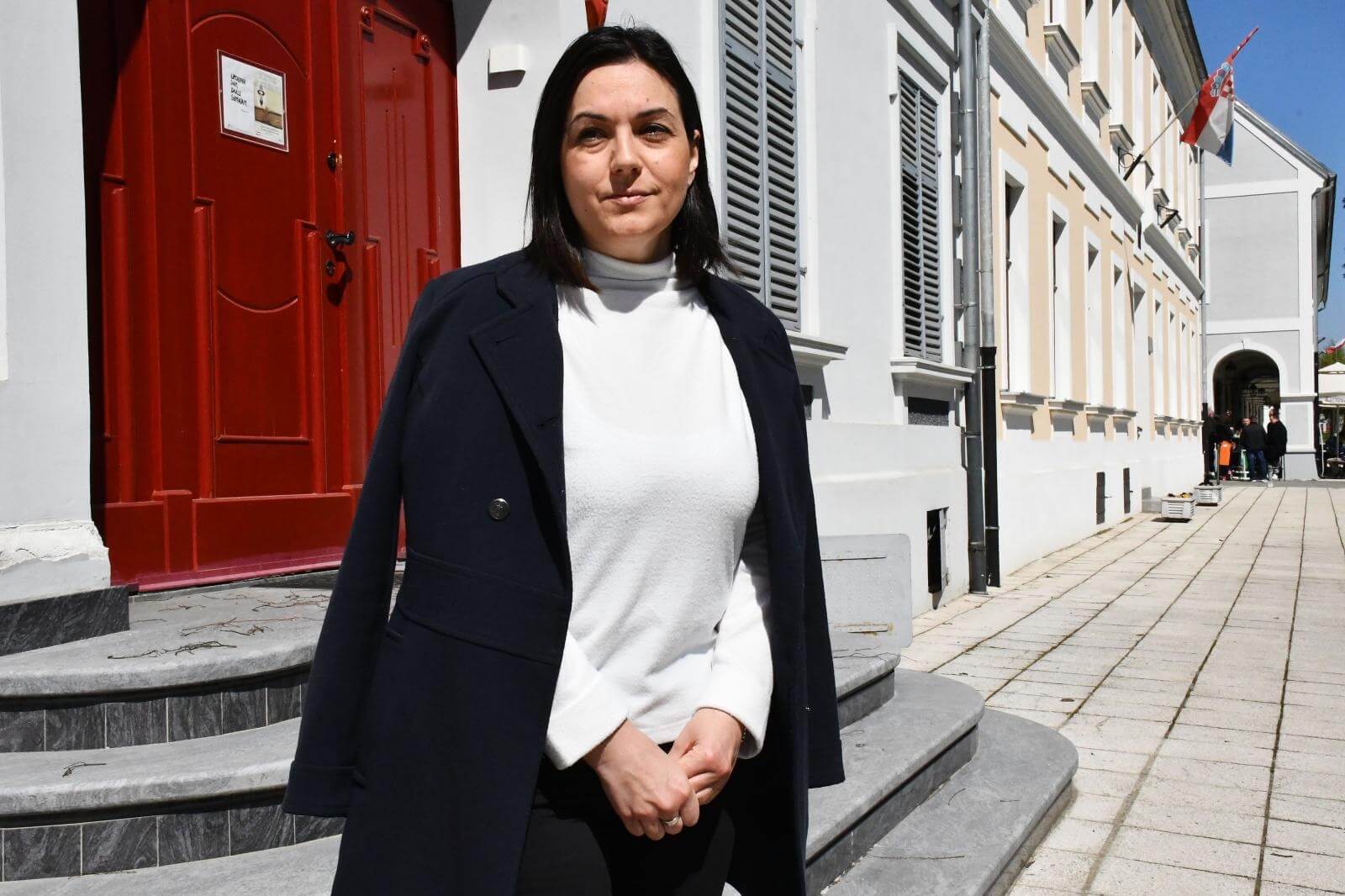
© Ivica Galovic / PIXSELL
Following the tragic death of a 2-year-old girl who was heavily beaten by her mother and neglected by her parents resulted in Marija Jugović taking the position as the new headmaster of Social Welfare Centre Nova Gradiška on Monday. Jugović replaced the former headmaster Branko Medunić, following the controversial decision of returning the girl from her foster family back to her biological parents, who previously neglected and abused her, which ended fatally.
As Večernji List reported, Medunić is still employed in the Centre, and Jugović said on Monday that the investigation by the ministry would show if there were any misconducts in handling the case.
„Medunić is a social worker, and he is currently doing the job according to his occupation“, said Jugović.
Pending the results, Jugović announced lay-offs in the Nova Gradiška Centre. The investigation was expected to be complete by Wednesday.
„It's determined that there were mistakes in the procedure, which was the mistake of the headmaster. We are still waiting for professional findings from Croatian Social Workers chamber and Croatian Psychology Chamber“, said Josip Aladrović, Minister of family and social policies, on Wednesday as a guest On National Croatian Radiotelevision (HRT).
He added that restrictions in the Centre were done immediately based on those findings, and other results are expected to be complete by the end of the week.
Highlights of the week: April snow in Zagreb brought shock and traffic
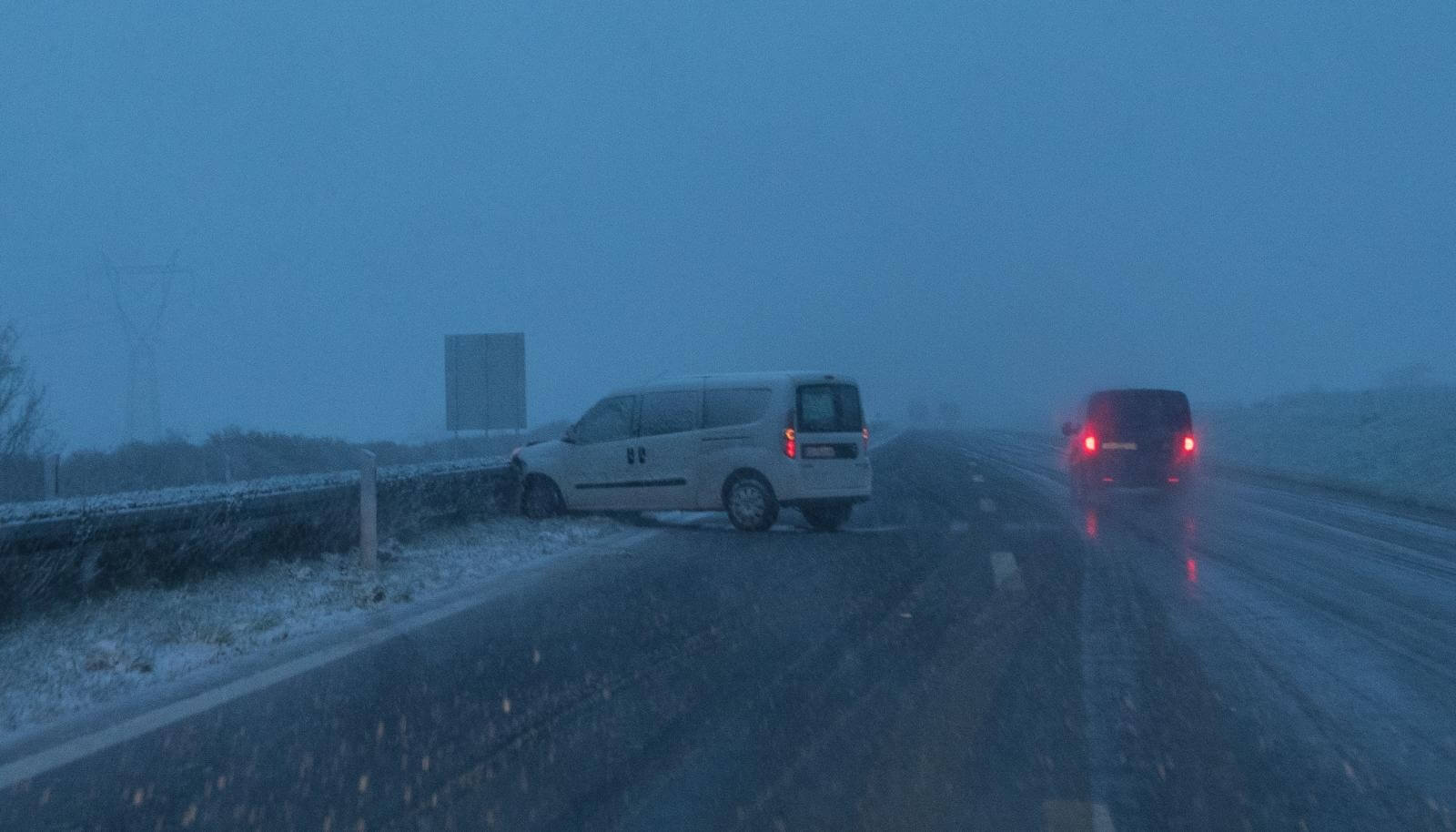
© Bruno Fantulin / PIXSELL
The heavy snow, which was announced but still surprised the citizens of Zagreb thanks to its intensity, caused chaos on Zagreb streets on Tuesday. Traffic was jammed and several accidents occurred. Still, the snow quickly melted away and meteorologists announced warmer weather by the end of the week.
Citizens of Zagreb were in disbelief of such heavy snowfall in early April, a day after it was a little under 20 degrees Celsius.
Highlights of the week: Ivica Puljak and Bojan Ivošević competing together in Split local elections
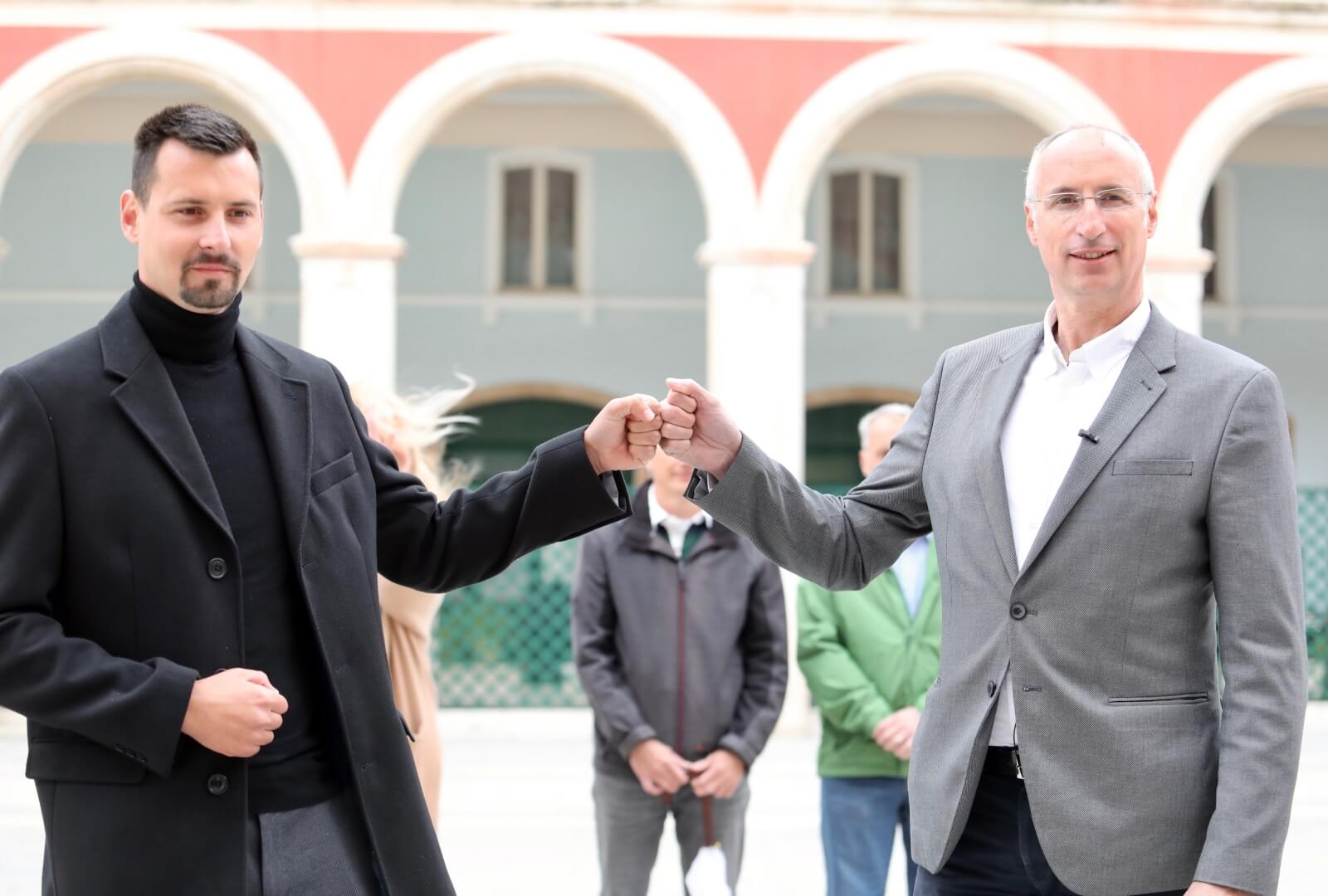
© Ivo Cagalj / PIXSELL
Mayoral candidate of Centre Party Ivica will compete in the upcoming local elections for Split Mayor with the independent candidate Bojan Ivošević who aims to be his vice-mayor. As Večernji List reported on Tuesday, the pair said this decision was easy for them as neither one had to betray their beliefs when agreeing to this collaboration.
„In this election, the civil, progressive Split we represent is waking up like never before. We united our teams, Split has a chance it didn't have in decades, and if we don't use it, we won't get another opportunity for four years, maybe even longer. We have to take this chance“, said Ivica Poljak.
Bojan Ivošević is confident they will win elections and „return freedom to the citizens of Split and end trading authority in Split“.
Highlights of the week: Construction of connecting Kaštel fort with underground tunnels ongoing in Pula
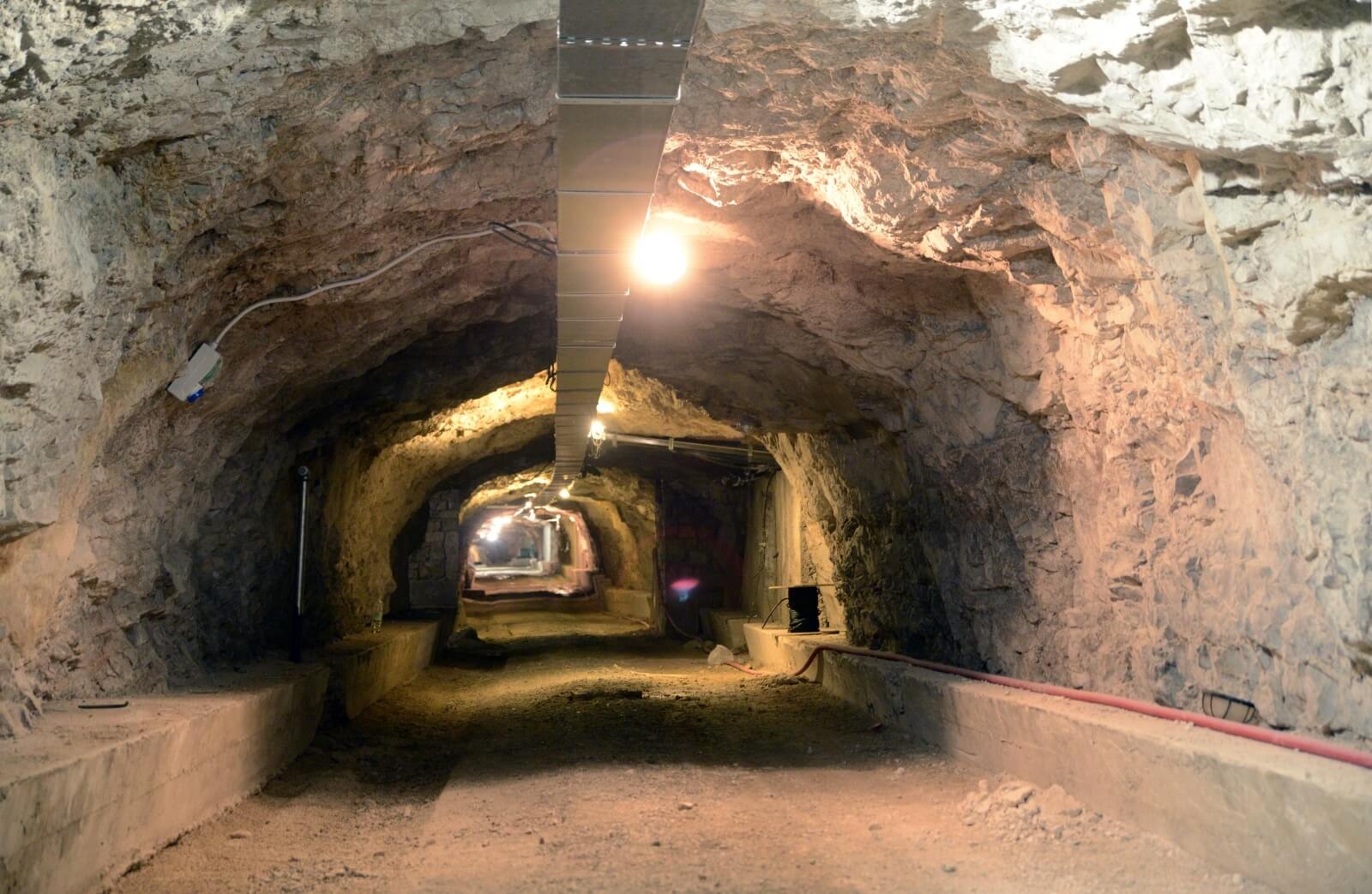
© Sasa Miljevic / PIXSELL
One of the most interesting tourist projects this year is taking place in Pula. Fort Kaštel is being connected with a network of underground tunnels that date back from the Austro-Hungarian times when Pula was the main military port. After the project was announced as early as 2019, the shaft where there will be a tourist elevator that will connect the fort with tunnels was finally been pierced last Friday.
Highlights of the week: Dinamo defeated by Villareal
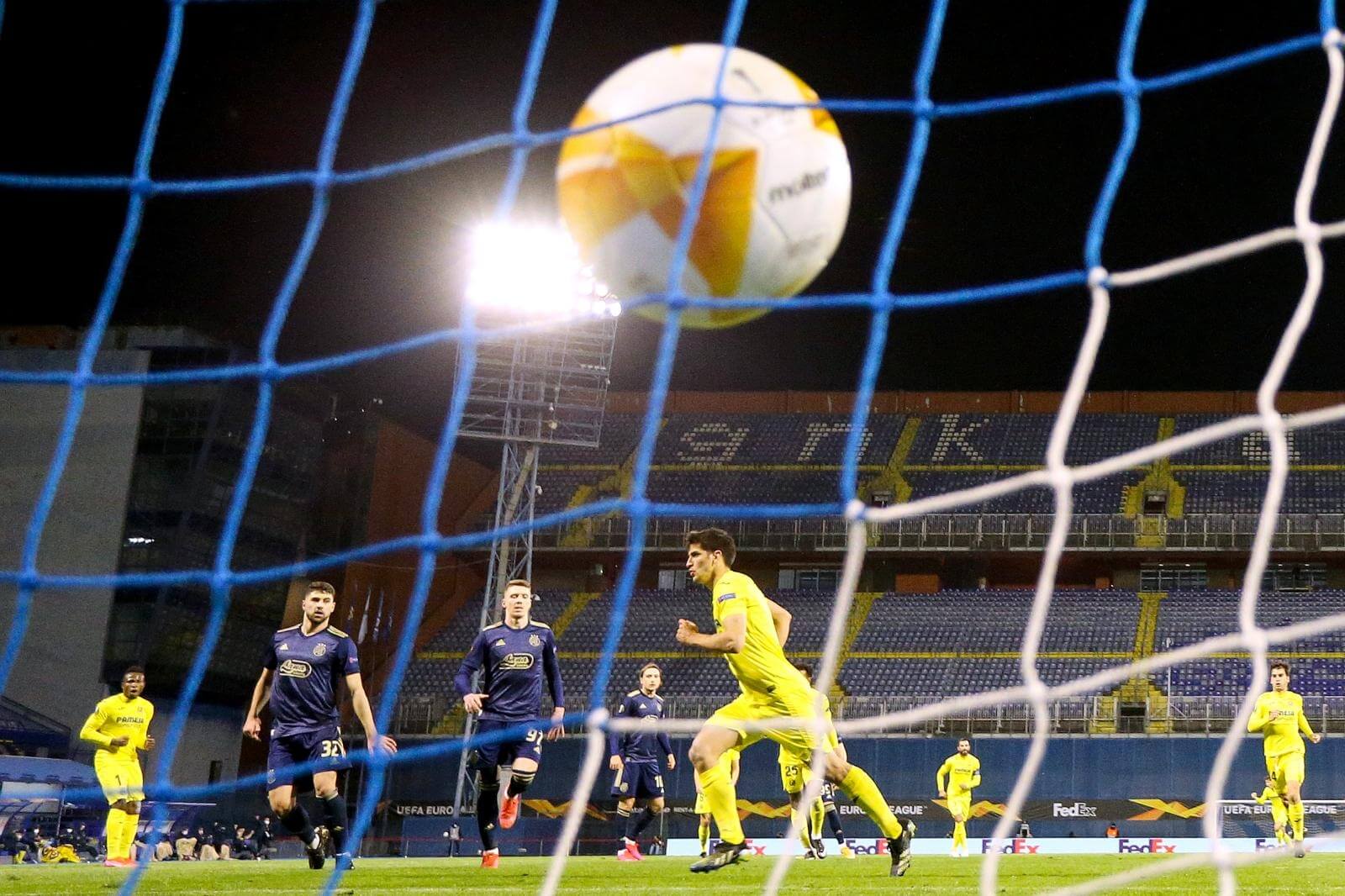
© Goran Stanzl / PIXSELL
After the brilliant victory against Tottenham, Dinamo's luck and skill took a blow in the clash with Villareal on Thursday.
Despite Dinamo handling well against the first attempt of Villareal and few risky shots aimed at Zagreb's gate, it all went well until the very end of half-time when Moreno scored for the Spanish club, taking advantage of a penalty Dinamo received for Theophile's handball.
Dinamo didn't manage to level the result or turnover the game but reduced the loss to the lowest possible outcome. Whether Dinamo is able to come on top against Villareal will be known next Thursday when they visit Villareal in Spain.
For more about politics in Croatia, follow TCN's dedicated page.
To read more about sport in Croatia, follow TCN's dedicated page.
To follow all news from Croatia, subscribe to our newsletter.
Pensioners' Platform Presents Its Candidate For Zagreb Mayor
ZAGREB, 9 April, 2021 - The Pensioners Together platform, which brings together a number of pensioners' associations and parties, on Friday presented its candidate for Zagreb Mayor, Milivoj Špika, and the candidate for deputy mayor, Blanka Sunara.
Addressing a news conference, Špika said that some candidates for Zagreb mayor behaved like revolutionaries, wishing to destroy current structures and announcing radical changes, while others acted as if Zagreb were their loot.
"Zagreb needs someone who will carry out peaceful transition from the current model of governance to a new model of running the city," Špika said, adding that the platform would focus on pensioners, workers with inadequate pay, people with blocked bank accounts and other social groups.
For more about politics in Croatia, follow TCN's dedicated page.
VIDEO: Zagreb Earthquake 2020, One Year Later
March 22, 2021- On the Zagreb Earthquake 2020 first anniversary, TCN reporters Ivor Kruljac and Jose Alfonso Kusijanović took to Zagreb's streets to see how locals feel one year later.
6:24 AM March 22, 2020. It was Sunday, but sleep was as light as it was a workday full of obligations. Zagreb's citizens were awakened by a horrible sound followed by walls shaking, the ground trembling and things falling all over the place. Amid the coronavirus pandemic, at the very end of the first week of the first lockdown where it was advised to stay indoors to prevent the spread of the virus, there was no choice but to rush out of the house, discombobulated and without a clue of what exactly is the damage that 5.5 magnitude earthquake did. Individuals, couples, and entire families were outside but at a distance from one another, and just after the first aftershock, it started to snow. If you didn't leave the very center of Zagreb, the first sign of damage was the cathedral, whose top of the left tower collapsed, and only later you started to see the images of the center, which many compared online to Beirut. The Covid-19 National Response Team expressed its condolences on TV but warning everyone to keep the distance due to corona. Emergency services rushed to the city, later followed by the army. People who lost their homes were taken to student dorms and other locations with free space in the following days. Sadly, a 15-year-old-girl was fatally injured during the earthquake and passed away at Klaićeva's Children Hospital.
One year later, citizens of Zagreb still have mixed feelings about the event. Here are their answers in our short interview.
Shaking the memory
Senior citizen Ljerka was walking around European Square. Her home survived the quake, and the aftermath was books that fell from a shelf and broken bottles and jars in her pantry. She learned about that damage after a few days when she returned home from her sister's because she was too scared to be alone. The memory of last year still gives her the chills. „I jumped out of bed and lost my head; you have no idea where to go. You don't know what to do. I quickly grabbed something, half-dressed, rushed to the street. People were standing outside confused who didn't know where to go or what to do, nothing“, she said. Describing herself as an optimistic person, the scary experience is still stuck with her even one year later. „You remember it from time to time, but you can't forget it," said Ljerka.
A young guy named Dejan Jakovljević was casually walking around a crowded Dolac market, carefully with a mask to respect the measures in the crowds. He handled the earthquake pretty well as he lives in a new building with lots of concrete and reinforcement.
„It woke me up, but I knew it was an earthquake. It didn't scare me. I just waited for it to be over“, said Dejan. Responding to how he feels about it one year later, he briefly acknowledged that he „honestly forgot about it. “
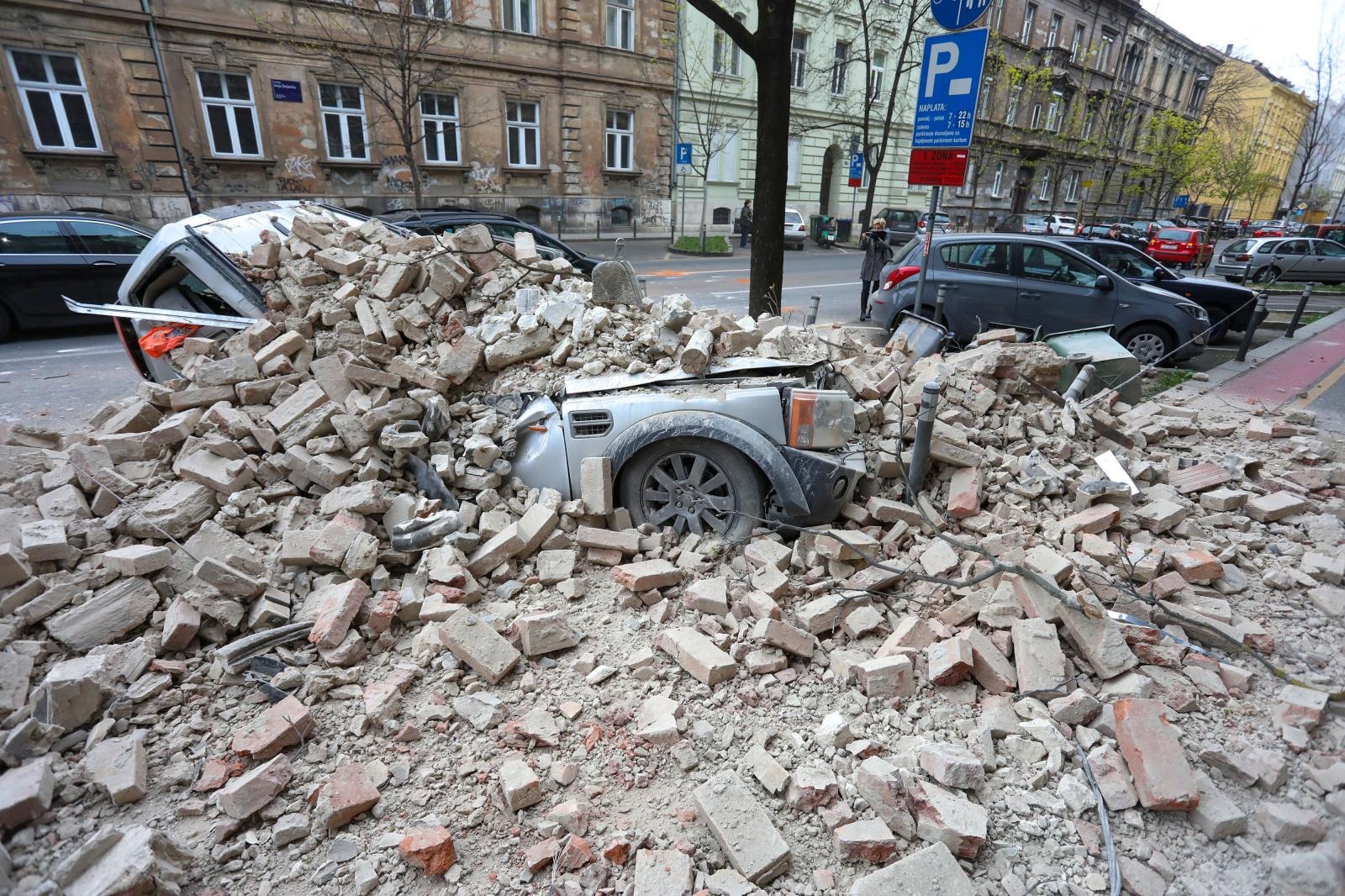
Borna Filic / PIXSELL
The same can't be said for American-born Stefanie Mikac from New York. We met her while she was walking her dog in Zrinjevac park. Her home was badly damaged. „I was in the bathroom dancing left and right. I didn't think it was an earthquake, I thought 'what is it, the devil had come!’ and there was smoke“, remembered Stefanie. When she realized it was an earthquake, she hid under the door, and when it passed, she searched for her dog that hid in the apartment before finally escaping her flat. On her trip to Hawaii, where earthquakes are quite frequent, she accepted that there is not much you can do against mother nature. Despite her bad experience, a year later, she feels safe in Zagreb. „Very secure, safe. You know, you have to take things as they come, “ said Stephanie sharing her positive attitude.
We spotted Mira Francem walking on Jelačić square. Her house was built following all the construction demands and proved to be earthquake-proof. Still, the rocky feeling isn't something that she liked. „I personally felt terrible. I had a feeling the whole world was collapsing, and in the end, that feeling of losing the ground under my feet is an instinct, you know?”, said Mira adding that even though her house is fine, the trembling ground was awful. When asked if there is still anxiety over the last year's event, she resoundingly repeated, “yes.”
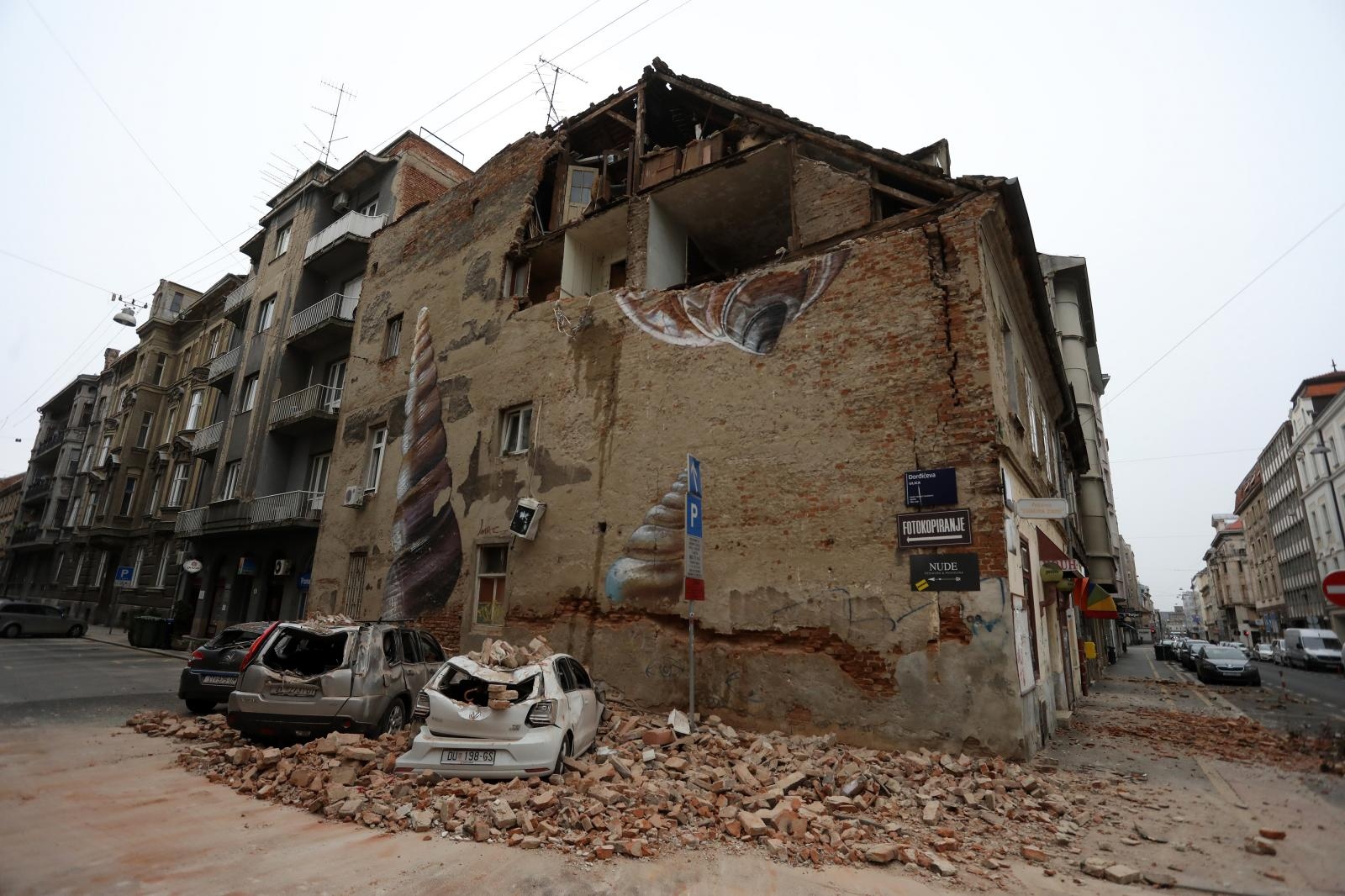
Borna Filic / PIXSELL
Mladen Habuš was standing on Vlaška street that connects European Square with Kaptol, where the City's cathedral is located.
“My home was okay. The earthquake surprised everyone at first, but fortunately, they don't last, so you stabilize psychologically”, said Mladen calmly, as if it didn’t really leave an impression on him.
“I already forgot about it because it's not as frequent as in Glina or Petrinja, whereas they say, it shakes every five minutes,” he emphasized, and that the key is to remain relaxed.
December – another round, another rumble
The second earthquake with a 6.4 magnitude that hit Petrinja and ravaged Banovina / Banija didn't damage Zagreb as it did to the southern part of central Croatia. Still, it was certainly felt, and many agreed it was stronger than the one in March.
„Jesus Christ! That one was even worse!“said Ljerka the second I mentioned the Petrinja earthquake. She learned that Zagreb is situated in a seismic active area, and earthquakes are something people in Zagreb need to learn to live with, but March didn't make her welcome the December tremble with more ease. She ran out of the house, not knowing what when her niece, who also lives in Zagreb, called her.
„I asked her if there was another earthquake in Zagreb. I didn't get anything. She said, 'no, that's the aftermath of Petrinja.' We are really close to Petrinja“, said Ljerka.

Nikola Cutuk / PIXSELL
Stephanie was walking her dog during the Petrinja earthquake. She witnessed bricks falling and was relieved nobody was passing underneath at the time. However, when she returned home, she entered the mess, and the damages that were still not fixed from March intensified. „All the cracks are wider now, and everything will need to be taken down to get to the healthy wall,” said Stephanie.
When asked if the December quake was easier or the same to handle for her, she laughed, acknowledging that it was actually worse. “We repeated the reactions from the first earthquake, you know? It's a very unpleasant feeling even today when a tram passes or something buzzes. I think something is trembling, and we are quite tense”, shared Mira. She said that no matter how rational you are, consequences as emotions are different from rationale. “I'm really sorry for those people. My house isn't damaged, but I was scared and lost, and I can only imagine how those people felt. It's a huge catastrophe on which we cannot influence,” said Mira with empathy.
Dejan felt the December quake was stronger but feeling safe in his building; he wasn't too worried. “I instinctively rushed to save the TV. Everything else was irrelevant”, recalled Dejan with gentle laughter underneath his mask.
Despite Mladen being relaxed after Petrinja, anxiety crept up on him too. “You start listening; someone starts a car, you raise your head to see what's going on. You are expecting another earthquake”, said Mladen. Still, he added that “you get used to it.”
Insurance vs. safe building
As revealed earlier this year, 85% of Croatian households don't have earthquake insurance.
Dejan doesn't know if the building had insurance but given his building proved safe, he didn't seem too concerned with that question.
Mira also didn't have insurance, but her investment in the safe building certainly paid off.
Stephanie's home was badly damaged, but she pays 1200 kuna annually for insurance and says it isn't too expensive in Croatia. However, regarding the walls in her home that need to be fixed, there was a bit of an issue. „The insurance company actually secured only the furniture, but then through a lawyer, we made a deal to cover half of it. Something is better than nothing“, said Stephanie.
Ljerka complemented her landlord and how she manages things. Her building received a green sticker but chimneys needed to be removed. Insurance helped there a lot. „We took down the chimney ourselves, and we got the money back, I think 3000 kuna, “ said Ljerka. The roof was renewed a year or two ago, but the same couldn't be said about the terrace residents have in the back of the building. Insurance didn't want to cover it, and a loan was needed to be taken for the fixture.
City officials to the rescue! Or not?
Both the country and international community, not to mention companies and individuals, rushed to help Zagreb, and the now-deceased mayor Milan Bandić found himself challenged to return Zagreb to its old glory and shine as fast as possible. The situation even called for a Zagreb reconstruction bill on the parliament level as the government took the lead in rebuilding the city. In the meantime, Bandić passed away, and with local elections coming up, the city's repair remains a topic for all the candidates that hope to take the lead chair of city politics in May.
Regarding the response of the city officials, Ljerka isn't happy.
„What did the city do? Nothing. It was all ruins. Look at what Zagreb looks like now after the earthquake. How long has passed, and nothing is done. Nothing. Only the houses that people renovated themselves, but the city gave nothing”, commented Ljerka. She did, however, add that the city doesn’t have money and that she understands that.
Mira shares Ljerka's opinion that the situation is better for those who organized repairs privately. Still, when it comes to the city authority response, she says, „it should have gone faster, better, and more organized. “
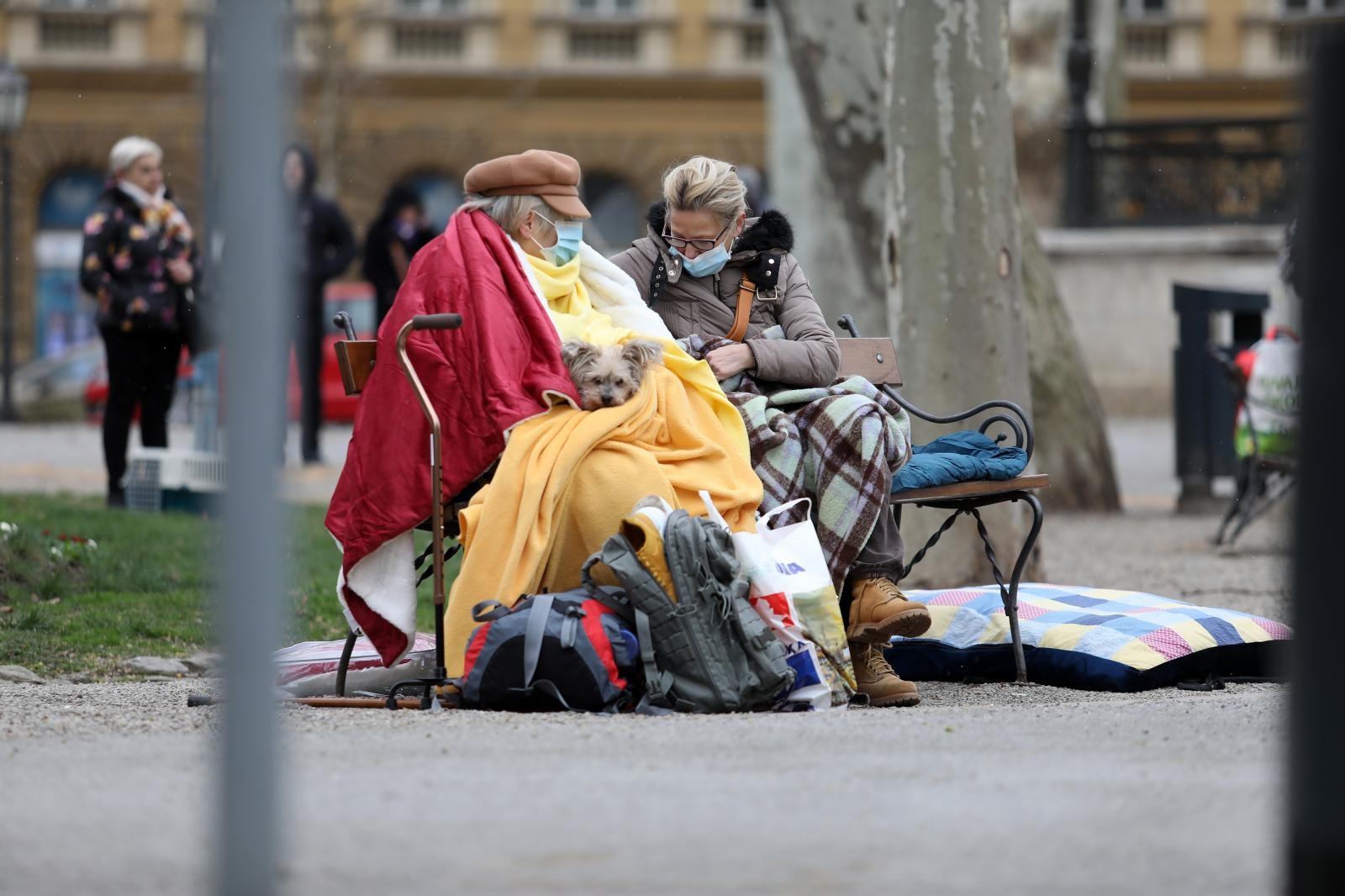
Borna Filic / PIXSELL
„I see a lot of my friends who live in the center. It's all at a standstill. For those who engaged themselves privately, it is better, but otherwise, it is prolonged. It needs to be better, more active, more engaged to ease the people and make them stronger."
Dejan also thinks that the authorities' response was not good and that “they should help people.“
When asked to comment on the city's response to the earthquake damage, Stephanie was hesitant at first. She feared many people would disagree with her opinion and her different way of thinking because she lived in the US.
“Over there, we have asbestos insurance and insurance for everything. If you have a bank loan and the bank has input on the house, you have to have insurance”, explained Stephanie asking me if it is fair for her to pay the insurance while others don’t and later demand the city to pay for everything. “Imagine if the city would fix apartments for everyone and secure the buildings. Nobody would ever do that anywhere. They may give you a percentage, but that's it,” concludes Stephanie.
Mladen is happy with the city's response.
“I think the city, to my knowledge and how much I followed, was the only one that jumped to help those who lost their homes and put them in free spaces,” Mladen pointed out. He also reminds us that the government took over the rebuild and the city is involved with 20%. When asked if it’s good for Zagreb that the government took the lead over the city, a resounding yes was the final answer. “The city doesn't have enough money, so the government needs to jump in," concluded Mladen.
Steady ground wishes above all
Being the biggest and the capital city of Croatia, which attracts people from everywhere in the country and beyond, Zagreb streets offered truly diverse answers to Jose and me. There was more or less fright on March 22, 2020, and different levels of anxiety today. Different views on insurance and the city’s response. We can only guess how differently they will vote in May. But one wish is the constant for the Purger's hearth - the wish to see Zagreb as a safe city where you only get awakened by an alarm clock.
For more about the earthquake in Zagreb, follow TCN's dedicated page.
Jelena Pavičić Vukičević Announces Running for Zagreb Mayor
ZAGREB, 19 March, 2021 - Jelena Pavičić Vukičević on Thursday accepted the nomination by the Bandić Milan 365 - Labour and Solidarity party to run for Zagreb mayor at the local election in May.
After a meeting of the party's presidency, Pavičić Vukičević said that she would lead the party to victory.
After Zagreb Mayor Milan Bandić's death, his deputy and long time associate Pavičić Vukičević stepped in as acting mayor until the election.
Jelena Pavičić Vukičević was Bandić's associate from the very start of his career and she herself has had many years of experience in the city's administration.
When Banidć was elected for his first term as mayor in 2000, she was the secretary of the Zagreb branch of the Social Democratic Party and a councillor in the city assembly. Three years later she was elected to parliament and in 2008 she was appointed as the head of the City office for education, culture and sports. From 2009 to 2013 she was appointed as Bandic's deputy mayor. In the 2017 local election, she was directly elected as deputy mayor of Zagreb.
For more about politics in Croatia, follow TCN's dedicated page.
The State Electoral Commission (DIP) Tells Donors to Respect Law, Take Note of Allowable Amounts for Electioneering
ZAGREB, 16 March, 2021 - The State Electoral Commission (DIP) has advised companies and citizens who intend to make a donation to participants running in the May local election, to respect the law and take note of the maximum allowable amount that may be donated.
All physical and legal persons intending to donate money, products or services are obliged to register all the relevant information and should be issued with a receipt by the recipient party or independent slate.
Donors must not have any debts to the state or local authorities.
If donations are made in products, then the value of these must be identified.
The maximum amount of a donation for physical entities is HRK 30,000 and for legal entities HRK 200,000. Donations can be made once or in several instalments and must be pad into a separate electioneering account.
Contracts for donations greater than HRK 5,000
Donations of HRK 5,000 or more require a contract to be concluded between the donor and recipient (party or independent slate).
DIP has published guidelines regarding the financing of electioneering which are available at its website.
For more about politics in Croatia, follow TCN's dedicated page.


